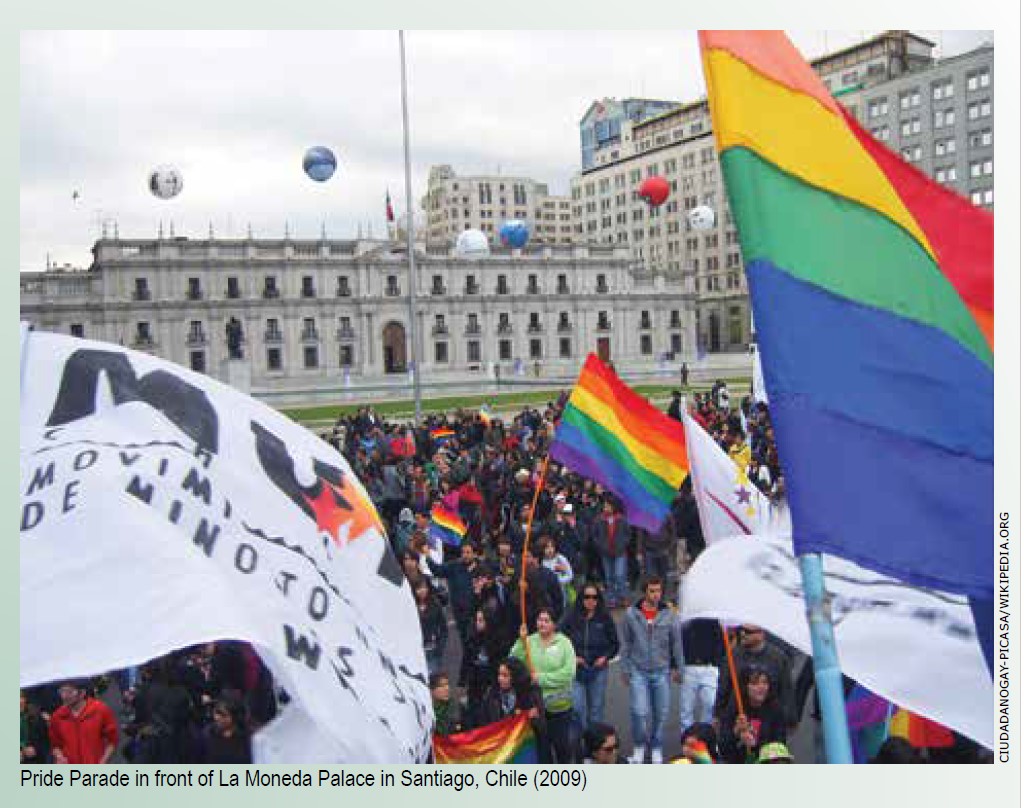
By Stuart Gaffney and John Lewis–
It’s nearly 10,000 miles from Utqiagvik, Alaska, the northernmost community in the United States to Cape Horn at the southernmost tip of Chile. But very soon, same-sex couples may have the freedom to marry in these two poles of the Americas, spanning nearly the entirety of the Western Hemisphere.
It’s all because of the perseverance of Chile’s LGBTIQ community and its allies.
Nearly ten years ago in 2012, Chilean LGBTIQ rights advocates filed a lawsuit for marriage equality with the Inter-American Commission on Human Rights. After four years of delay, the Chilean government led by then-President Michelle Bachelet, a marriage equality supporter, agreed in 2016 to settle the case and promote marriage equality legislation in the national legislature. In August 2017, Bachelet finally introduced that legislation.
But in November 2017, Chile held its presidential and national legislative elections, and the pro-equality candidate whom Bachelet hoped would succeed her lost to current Chilean President Sebastián Piñera, who had introduced Chile’s civil union bill but staunchly opposed marriage equality.
There was still time left, though. Piñera and the new legislature would not take office until March 2018. If Bachelet and the sitting legislature that favored marriage equality—as did 60 percent of the population according to public opinion polls—scrambled, they could still pass the legislation.

Adding to the drama, the Inter-American Court of Human Rights in a sweeping landmark decision ruled in favor of marriage equality (as well as transgender rights) in January 2018 in a case arising out of Costa Rica.
The Court decision is binding on Chile and 22 other Latin American and Caribbean countries, which are active parties to the American Convention on Human Rights. But the Court unfortunately lacks an enforcement mechanism to ensure that signatory countries implement so-called advisory rulings, like the marriage equality decision. Member countries must still change their laws through their own legislatures or courts.
And time ran out in Chile. Despite the ruling, the Bachelet government failed to pass the legislation before marriage equality opponent Piñera and the new legislature took office.
Far from giving up, the Chilean LGBTIQ community remained steadfast and vocal in its advocacy for full equality. Couples continued filing lawsuits both in Chilean courts and the Inter-American Commission on Human Rights seeking equality.
In October 2020, Chileans voted overwhelming to hold a Constitutional Convention to rewrite the nation’s constitution. In May 2021, an unprecedented eight openly LGBTIQ people won election to the 155-member Convention that will draft the new document. The Convention also has gender parity and never-before-seen representation of indigenous people and other diversity. LGBTIQ candidates additionally won election in local and regional elections held at the same time.
Then in June, President Piñera stunned the nation when he did an about face and endorsed marriage equality in his annual address to the Chilean Congress. Piñera, who had been facing increasing opposition to his government overall, perhaps took note of the results of the May elections and ever-growing support for LGBTIQ equality. He requested that Congress act with “urgency,” a procedure authorizing expedited passage of legislation.
A few weeks later, the Chilean Senate approved the marriage equality bill by a 2–1 margin. All that remains is for the Chilean Chamber of Deputies, the lower house of Congress, to approve the legislation.
Once again, time is of the essence. Chile will hold its presidential and national legislative elections in November 2021.
As we watched the events in Chile unfold, we are reminded of the countless times LGBTIQ people have had to fight with great urgency to convince courts, legislatures, and voters that justice delayed is justice denied.
Back in February 2004, we and thousands of same-sex couples from across the country and round the world dashed to San Francisco City Hall thinking we might miss a once-in-a-lifetime chance to get married. We remember our disappointment when one of the California Supreme Court Justices at oral argument on the validity of the marriages naively asked Therese Stewart, counsel for the City of San Francisco, what the rush was.
As we wrote in this column over three and a half years ago: “The time for full marriage and LGBTIQ equality is now.” Thanks to the perseverance of Chilean LGBTIQ people, now might come very soon.
Stuart Gaffney and John Lewis, together for over three decades, were plaintiffs in the California case for equal marriage rights decided by the California Supreme Court in 2008. Their leadership in the grassroots organization Marriage Equality USA contributed in 2015 to making same-sex marriage legal nationwide.
Published on August 26, 2021
Recent Comments